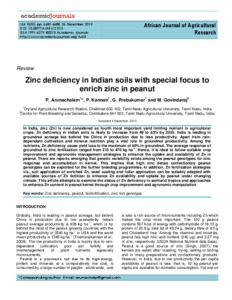Zinc deficiency in Indian soils with special focus to enrich zinc in peanut
Abstract
In India, zinc (Zn) is now considered as fourth most important yield limiting nutrient in agricultural crops. Zn deficiency in Indian soils is likely to increase from 49 to 63% by 2025. India is leading in groundnut acreage but behind the China in production due to less productivity. Apart from raindependant cultivation and mineral nutrition play a vital role in groundnut productivity. Among the nutrients, Zn deficiency cause yield loss to the maximum of 40% in groundnut. The average response of groundnut to zinc fertilization ranged from 210 to 470 kg ha-1. Hence, it is ideal to follow suitable crop improvement and agronomic management strategies to enhance the uptake and availability of Zn in peanut. There are reports emerging that genetic variability exists among the peanut genotypes for zinc response and accumulation in kernel. This implies that high zinc dense confectionary peanut genotypes can be exploited for the further breeding programmes. In addition, Zn fertilization strategies viz., soil application of enriched Zn, seed coating and foliar application can be suitably adapted with available sources of Zn fertilizer to enhance Zn availability and uptake by peanut under changing climate. This article attempts to examine the status of Zn deficiency in semiarid tropics and approaches to enhance Zn content in peanut kernel through crop improvement and agronomic manipulation

